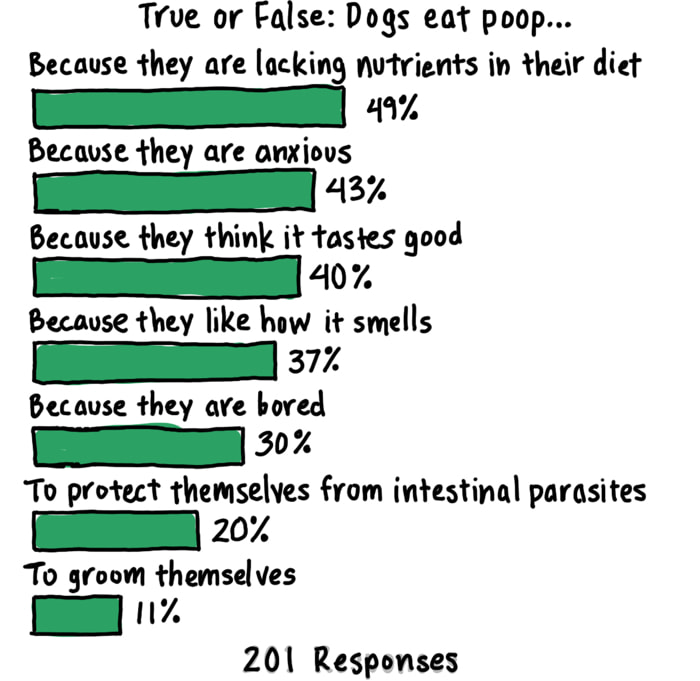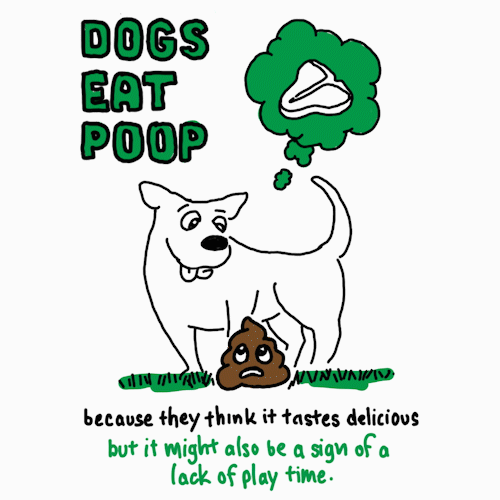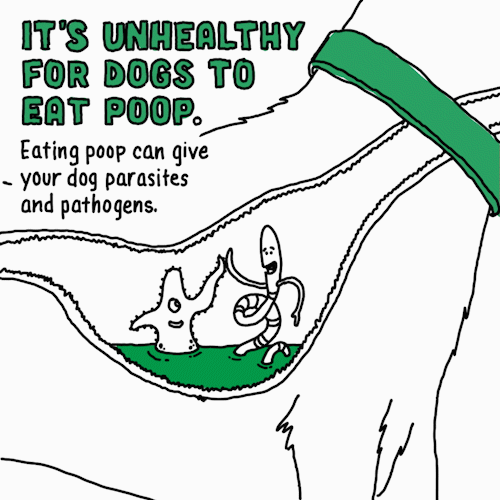

Like any companion or roommate, dogs — for all their love and cuteness—have habits we just don’t understand. One question dog owners often ask their pets: “Why? Why would you eat poop?”

When we polled* dog owners recently, most thought it was because a dog is lacking nutrients (49%), they’re anxious (43%) or they just think it tastes good (40%).
Dogs are significantly more likely to eat the droppings of another species (e.g., horses, rabbits) than their own.
We held our noses and got to the bottom of the issue with the help of some experts.
While those in our poll thought this was the number-one reason for the behavior, it has actually never been proven. “It’s a myth dogs eat poop because they’re seeking nutrients they aren’t getting. There’s no evidence to back this,” says
Opens a new windowDr. Jo Gale, BVetMed CertLAS MRCVS, Senior Manager, Global Science Advocacy at Waltham Petcare Science Institute.

According to Opens a new windowDr. Tammie King, Applied Behavior Technical Leader at Waltham Petcare Science Institute, “It can occur where there is lack of environmental enrichment. You see this often in dogs who are kenneled and have a lack of opportunity to exhibit normal canine behavior.” So if you need another excuse to get out and play with your pooch, this is a good one.
Believe it or not, this is the main reason dogs eat poop. Dr. Jo Gale explains: “Dogs are scavengers by nature and use any opportunity to eat what they can, when they can. They consider it a ‘tasty snack.’” Dr. Tammie King adds that “[Dogs eating poop] is a learned behavior. They’ve done it, enjoyed it, and that behavior is repeated.”
We love our dogs so much that we’re willing to trust our best friends on this. Maybe we should come out with a line of doggie breath mints though. Hmm.

“Ingesting feces from any animal increases potential for ingesting parasites and pathogens,” cautions Opens a new windowDr. James Serpell BSc, Phd Professor of Humane Ethics & Animal Welfare at University of Pennsylvania School of Veterinary Medicine. He went on to say, “[It’s] not something humans should ignore, but it's not worth getting too excited about it.”
All the experts we consulted said that if your dog occasionally eats poop, it’s nothing to be overly alarmed by. Just keep an eye on the frequency and their overall health. And as always, make sure they’re getting a nutritious diet and plenty of exercise and attention. If you have any concerns contact your vet.
Despite dogs liking the taste of poop, we’re going to stick with the healthy range of more traditional flavors offered in all IAMS dog foods.
*Surveyed U.S. dog owners, age 18+
Sample Size: n=201
Fielded May 8 to May 10, 2020


It is a sight no dog owner wants to see – your beloved pet heaving and uncomfortable, its body racked with nausea. For many, the sound of a dog vomiting sets off alarm bells. But why do dogs vomit, and what causes an upset stomach in dogs? More importantly, when is a dog's upset stomach merely a passing concern, and when does it indicate a more serious issue? Let's delve into these questions to better understand our four-legged friends' health.
Vomiting in dogs is a common occurrence and can be triggered by various factors. This process involves the forceful ejection of the contents within a dog's stomach or upper intestine. This action is often preceded by signs of nausea, such as drooling, licking lips, and swallowing excessively. Sometimes, the cause of vomiting is fairly benign – your dog may have just eaten too quickly or consumed something that didn't agree with its stomach. In other instances, it could be a sign of something more serious, such as ingestion of a toxic substance or a serious illness.
The reasons behind a dog's upset stomach are varied and can range from mild to severe. Upset stomach, medically termed as gastroenteritis, is caused by inflammation or irritation in the stomach or intestines. This can be triggered by a sudden change in diet, food intolerances, ingestion of foreign substances, bacterial or viral infections, and even serious conditions like pancreatitis or kidney failure.
One common mistake dog parents make is confusing vomiting with regurgitation. When a dog regurgitates, it's typically soon after eating and is a passive process, where undigested food comes up without much effort. On the other hand, vomiting involves active abdominal contractions and results in the expulsion of partially digested food mixed with bile.
Any dog owner knows that an upset stomach can leave their furry friend feeling less than their best. Recognizing the signs of an upset stomach can help in providing prompt care and relief for your pet. Typical symptoms include:
More serious signs include:
If your dog appears to be in pain, loses appetite, shows signs of dehydration, has a fever, or exhibits unusual behaviours such as lethargy, restlessness, or shivering, it's a clear indication that something is wrong.
In extreme cases, an upset stomach can result in weight loss and frequent vomiting in dogs, which can be a sign of serious medical conditions such as liver or kidney disease, pancreatitis, or even cancer. It is also important to monitor stress in your dog, as this can often exacerbate or trigger stomach issues.
When it comes to treating a dog's upset stomach, the appropriate treatment will largely depend on the underlying cause. If it's a mild case, such as a dietary change or eating too quickly, simple home remedies might be sufficient. However, if the condition persists or is associated with other serious symptoms, it's essential to consult with a vet.
Some common dog vomiting treatments are:
The best remedies for your dog’s upset stomach are probiotics such as IAMS™ Proactive Health™ Digestive Health Supplement and pumpkin, which can aid digestion. However, it's essential to remember that these are not cures but temporary solutions. If your dog continues to vomit or display signs of an upset stomach, a trip to the vet is necessary.
It's essential to remember that while some instances of dog vomiting or upset stomach can be managed at home, more frequent or severe symptoms necessitate a visit to the vet. Early detection of symptoms can make a significant difference in your dog's health. If your dog vomits multiple times in a day, shows no signs of improvement after 24 hours, or frequently throws up mucus, it's time to take your pet to the vet. The age and overall health of your dog also play a crucial role in this decision.
While home-cooked foods like skinless chicken, boiled potatoes, or rice can be good short-term options for a dog with an upset stomach, they are not nutritionally complete for long-term care. It's also crucial to avoid feeding your dog raw food, which can contain harmful germs like salmonella. Always follow your vet's recommendations to ensure your dog's health and safety.
In addition to following your vet's advice, consider integrating a digestive health supplement into your dog's diet. IAMS™ Proactive Health™ Digestive Health Supplement is a soft, chewable supplement that combines prebiotics and probiotics to regulate your dog's gut health. It contains no artificial colour, flavour, preservatives, or fillers, making it a safe and effective choice for enhancing your dog's digestive health.
Understanding the causes, symptoms, and treatments of dog vomiting and upset stomach, and consulting with a vet, when necessary, can help ensure your furry friend's well-being. Remember, their health is in your hands.


It is a sight no dog owner wants to see – your beloved pet heaving and uncomfortable, its body racked with nausea. For many, the sound of a dog vomiting sets off alarm bells. But why do dogs vomit, and what causes an upset stomach in dogs? More importantly, when is a dog's upset stomach merely a passing concern, and when does it indicate a more serious issue? Let's delve into these questions to better understand our four-legged friends' health.
Vomiting in dogs is a common occurrence and can be triggered by various factors. This process involves the forceful ejection of the contents within a dog's stomach or upper intestine. This action is often preceded by signs of nausea, such as drooling, licking lips, and swallowing excessively. Sometimes, the cause of vomiting is fairly benign – your dog may have just eaten too quickly or consumed something that didn't agree with its stomach. In other instances, it could be a sign of something more serious, such as ingestion of a toxic substance or a serious illness.
The reasons behind a dog's upset stomach are varied and can range from mild to severe. Upset stomach, medically termed as gastroenteritis, is caused by inflammation or irritation in the stomach or intestines. This can be triggered by a sudden change in diet, food intolerances, ingestion of foreign substances, bacterial or viral infections, and even serious conditions like pancreatitis or kidney failure.
One common mistake dog parents make is confusing vomiting with regurgitation. When a dog regurgitates, it's typically soon after eating and is a passive process, where undigested food comes up without much effort. On the other hand, vomiting involves active abdominal contractions and results in the expulsion of partially digested food mixed with bile.
Any dog owner knows that an upset stomach can leave their furry friend feeling less than their best. Recognizing the signs of an upset stomach can help in providing prompt care and relief for your pet. Typical symptoms include:
More serious signs include:
If your dog appears to be in pain, loses appetite, shows signs of dehydration, has a fever, or exhibits unusual behaviours such as lethargy, restlessness, or shivering, it's a clear indication that something is wrong.
In extreme cases, an upset stomach can result in weight loss and frequent vomiting in dogs, which can be a sign of serious medical conditions such as liver or kidney disease, pancreatitis, or even cancer. It is also important to monitor stress in your dog, as this can often exacerbate or trigger stomach issues.
When it comes to treating a dog's upset stomach, the appropriate treatment will largely depend on the underlying cause. If it's a mild case, such as a dietary change or eating too quickly, simple home remedies might be sufficient. However, if the condition persists or is associated with other serious symptoms, it's essential to consult with a vet.
Some common dog vomiting treatments are:
The best remedies for your dog’s upset stomach are probiotics such as IAMS™ Proactive Health™ Digestive Health Supplement and pumpkin, which can aid digestion. However, it's essential to remember that these are not cures but temporary solutions. If your dog continues to vomit or display signs of an upset stomach, a trip to the vet is necessary.
It's essential to remember that while some instances of dog vomiting or upset stomach can be managed at home, more frequent or severe symptoms necessitate a visit to the vet. Early detection of symptoms can make a significant difference in your dog's health. If your dog vomits multiple times in a day, shows no signs of improvement after 24 hours, or frequently throws up mucus, it's time to take your pet to the vet. The age and overall health of your dog also play a crucial role in this decision.
While home-cooked foods like skinless chicken, boiled potatoes, or rice can be good short-term options for a dog with an upset stomach, they are not nutritionally complete for long-term care. It's also crucial to avoid feeding your dog raw food, which can contain harmful germs like salmonella. Always follow your vet's recommendations to ensure your dog's health and safety.
In addition to following your vet's advice, consider integrating a digestive health supplement into your dog's diet. IAMS™ Proactive Health™ Digestive Health Supplement is a soft, chewable supplement that combines prebiotics and probiotics to regulate your dog's gut health. It contains no artificial colour, flavour, preservatives, or fillers, making it a safe and effective choice for enhancing your dog's digestive health.
Understanding the causes, symptoms, and treatments of dog vomiting and upset stomach, and consulting with a vet, when necessary, can help ensure your furry friend's well-being. Remember, their health is in your hands.